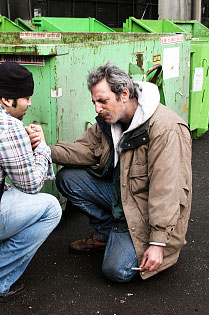A $1.2 million federal government grant for mental illness programs has made Bondi's Anglicare office viable once again.
Families and Housing, Community Service and Indigenous Affairs(FaCSIA) funding has been granted to Anglicare's Personal Helpers and Mentors program in the east and south-east of Sydney until June 2011.
Anglicare’s previously set-to-close Bondi office, located on the grounds of St Andrew’s, Bondi has a new lease of life as the natural choice for a base for the program, which will launch late in July.
 "We all got to the point of thinking Anglicare Bondi was finishing, we had to close the Family Support program last year because of a funding deficit" we did have a small team of Emergency Relief workers" who were going to relocate somewhere" and as God often does at the last minute, we got this announcement that we'd been successful ," says Anglicare's Community Care manager for the south-east/inner-west, Jill Wrathall.
"We all got to the point of thinking Anglicare Bondi was finishing, we had to close the Family Support program last year because of a funding deficit" we did have a small team of Emergency Relief workers" who were going to relocate somewhere" and as God often does at the last minute, we got this announcement that we'd been successful ," says Anglicare's Community Care manager for the south-east/inner-west, Jill Wrathall.
When Anglicare applied for the funding for six regions in the area in July last year, and hadn't heard a result by November, they presumed their application had been unsuccessful.
However February brought the ‘surprise’ news that Anglicare had won tenders for two of the six regions applied for: Watsons Bay to Randwick/Kingsford and La Perouse/Maroubra.
After assessing participants to determine their particular needs, the program will provide custom-designed care to address the ‘functional limitations’ of people with mental illness.
"People who have mental illness are often unable to motivate themselves and sometimes find it hard even to get out of bed. They often find it hard to do basic jobs like shopping, catching a bus and have often lost contact with family and friends."
While the program targets all people with mental illness, Ms Wrathall says it is particularly honing in on youth aged 16 to 24, homeless people and people from culturally and linguistically diverse communities, as well as indigenous communities in the La Perouse area.
Ms Wrathall says Anglicare has seen an increasing need in this area, especially since the financial crisis hit.
"I think housing is a huge issue, people not being able to afford rent " that's a basic issue affecting many many people, and there's a strong link between mental illness and homelessness, so one thing leads to another."
The program will employ 12 staff all in all "Â six in each region " of whom two are peer support workers with personal experience of mental illness.
“They're people who are not ashamed to talk about their own difficulties with mental illness " they’re going to be a resource to the team but also going to be able to support people who are going through it, because there's a real sense that unless you've experienced mental illness often you can be quite judgemental and not really understand the difficulties and the stigma that goes along with mental illness,” Ms Wrathall says
Before a participant begins the program, they will be assessed using a screening tool developed by FaCSIA which covers nine life skills areas: self care, mobility, communication, interpersonal relationships, learning and applying knowledge, education, community and economic life, and working.
Then a personal helper and mentor will meet with the participant wherever they feel comfortable to plan how to achieve their own personal goals for everyday living, working in partnership with health providers such as GPs and mental health nurses.
“It's not a program where you sit in an office and be interviewed, it's very much client-focussed, looking at the participants' strengths and being guided by them,” Ms Wrathall says.
“And obviously engagement is very important, building a relationship of trust, because so many times they've lost trust in people in the community.”
Program a Connect09 win for churches
Ms Wrathall says the Personal Helpers and Mentors program can help churches to better understand how to connect meaningfully with those who suffer from mental illness.
“I would say every church would have people who attend or who live in the wider church community who are affected by mental illness, and I think often parishes struggle to know how to care for people with mental illness,” she says.
“So the program is going to support churches in our region by offering community activities that will encourage people to feel included, valued and connected. We want those affected by mental illness to feel safe in their community and we want people to feel safe around those affected by mental illness. There's considerable fear in the community about people with mental illness that is most often not warranted.”
The program will also provide opportunities for volunteers to be trained in welcoming people with mental illness, and to partner with individual participants as they progress through the program.
“Once we have been working with a participant for a while and we feel they are going well, we'll be hoping to engage a volunteer in the community to support this person so that it's a natural flow-on from our program that they'll be linked back into their community,” Ms Wrathall says, adding that the program fits well with Anglicare’s focus on partnering with parishes.
“This program is all about developing a sense of hope that's real for people affected by mental illness, people who have become isolated and options have closed up for them in terms of employment and relationships " we want to help rebuild that sense of hope and purpose in living.”


























